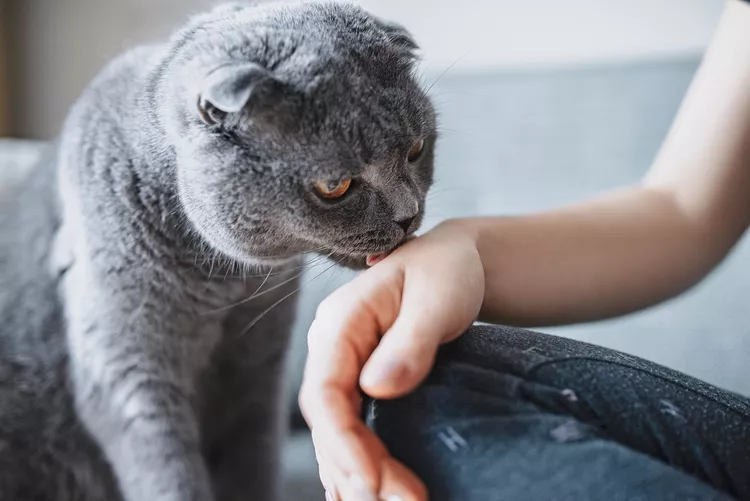
Cats spend a great deal of their waking hours washing their fur with their tongues, but what does it mean when your cat licks you? It's quite common for a cat to give their owner a lick or two on the hand, arm, or even the face. While licking is often a sign of affection from cats, it can have other meanings as well. Here are some possible reasons why your cat is licking you.
When a cat licks you, it's often a sign of affection or a method of cleaning, since cats lick themselves (or their kittens) in order to groom. However, cats will also lick each other to show various types of affection. A lick from a cat could indicate that they are marking their territory or reminding you that you're part of the family. Even though you can't read your cat's mind, you can be pretty sure that your cat is licking you because they like you.
In the same way that you show affection to your cat through petting, your cat may attempt to return the favor by licking you. After all, their mothers licked them when they were kittens, so a tongue bath is one of their primary associations with caretaking. If your feline friend loves to lick you, it probably means they would like some affection in return. Which, honestly, is one of the best parts of living with a cat. Just think of those little licks as your cat's way of giving you a kiss.
Cats use pheromones, which are scented hormones, to mark their territory. They have small glands in their cheeks that secrete the pheromones, which humans cannot smell, but other cats can. By rubbing their cheeks on furniture, other household pets, or your legs, they are marking their territory with their pheromones. However, your cat may also lick you as a way of claiming you as their own.
Licking and head rubs are affectionate ways for cats to claim you as part of their property. When your cat licks or rubs against you, they are reaffirming that you are important to them and they want all the other cats to know. You may notice that sometimes other cats shy away from you; it's possible that they smell that you already belong to another cat.
If you always react when your cat licks you, then they will quickly learn that licking provides them with attention. You might then find your cat giving you licks when they want food, petting, playtime, or even a cuddle session in your lap.
Many people joke that cats think they're humans and given the way some cats behave towards their owners, it's easy to see why. Some cats leave dead mice or birds on their owner's doorsteps in an attempt to share a tasty treat, but they may also be trying to teach you how to hunt. It's clear that not only do many cats see their owners as part of the family, but they also see them as a bit inept at being cats. Female cats especially will exhibit a sort of parenting or nurturing type of behavior.
When cats lick you, they may be trying to teach you to groom yourself. It's a memory your cat had from being licked by their own mother and is a real sign of affection. Cats will also lick other household felines as a way to calm them down. Cats are very attentive to their owner's moods so you might find your cat is more affectionate when you're stressed or sick. Cats are attempting to calm your anxiety the same way you would pet your cat if they seemed nervous.
One obvious reason why your cat might lick you is that there's something tasty on your skin. If you recently handled fish, meat, or other foods that cats like, your cat might want to lick the goodness off your skin.
Cats use licking for many things. Most commonly, they groom themselves or their kittens by licking. But a cat can also lick as a way to soothe itself when upset, angry, or anxious. And by extension, your cat might lick you if they sense you are sad, anxious, or upset. This is another way your cat shows you affection, care, or mothering.
Kittens who are orphaned or weaned too early can grow up to use licking as a way to satisfy the early oral stimulation they missed out on in early life. If your cat seems more persistent than most in giving you licks, and especially if they also like to "make biscuits" on you by flexing its paws and claws in and out on your skin, then there's a good chance your feline was not raised by their mother for long enough.
In general, it's safe to let your cat lick you from time to time. However, there are some risks to be aware of. Cat mouths contain a lot of bacteria that can make people sick, so make sure your cat does not lick any open wounds on your body. People with compromised immune systems may be sensitive to feline oral bacteria and should avoid being licked, especially around the face.
For your cat's safety, don't let them lick you if you have recently applied lotions or topical medications as your cat may ingest them. When in doubt, ask your veterinarian for advice.
A thorough cat licking isn't always the most comfortable experience. It can feel like sandpaper on your skin because cat tongues have backward-facing hooks that are meant to pull and clean their fur the way a comb would.
Remember, being licked feels good to your cat, so they don't know it hurts you. If the licking is a little too much for you, try redirecting your cat to an alternative behavior. Remove the area your cat is licking and give pets or offer a toy. If your cat continues to lick, withhold attention until the licking stops. Praise your cat when the licking stops.
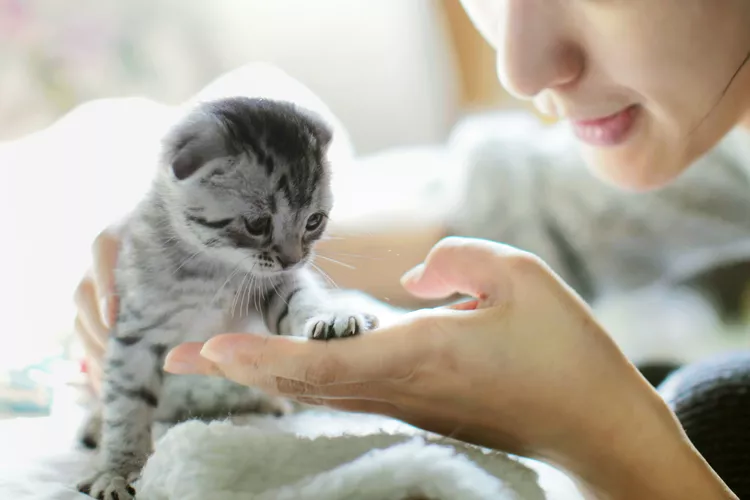
The First 30 Days With Your New Kitten
The first month is full of changes and excitement for a kitten in a new home. Find out what to expect and what you can do for your new feline friend.
How Old Is Your Cat in Human Years?
As a cat ages, there are often behavioral and physical changes too. Find out how to convert cat years to human years and what to expect at each stage.
What to Buy for Your New Cat: A List of Essentials
Before you bring your new cat or kitten home, there are a number of things to collect or buy so your cat will feel welcomed like a family member.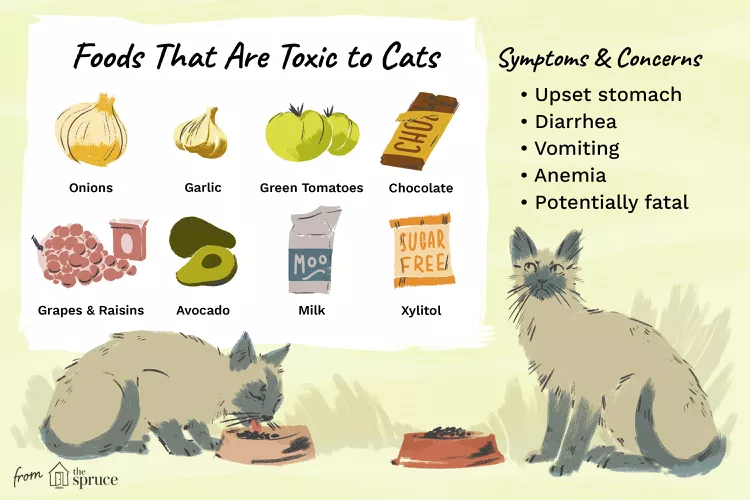
Human Foods That Are Poisonous to Cats
Many human foods are toxic to cats. Avoid feeding cats table scraps. Instead, feed a nutritious cat food created for their specific nutritional needs.
Cat Food Ingredients to Avoid
When checking the nutrition content of cat food, look for ingredients that are not healthy or show it is of poor quality. Avoid these 3 ingredients.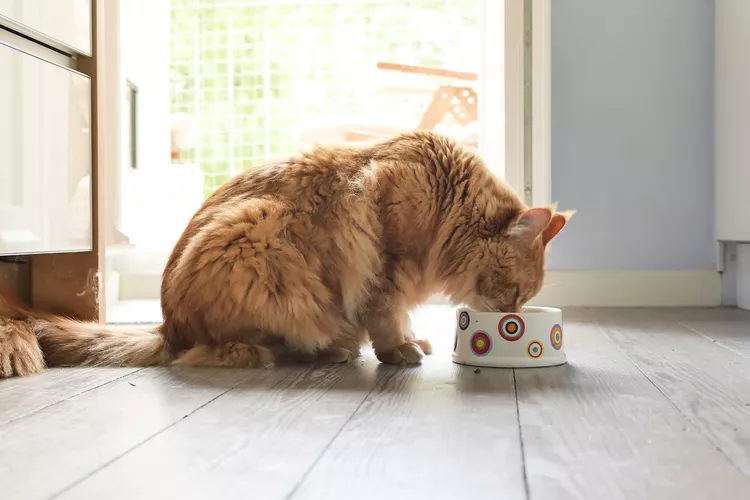
Should You Feed Your Cat a Raw Diet?
Learn the pros and cons of raw diets for cats, and find out how to choose a raw food diet for your own cat.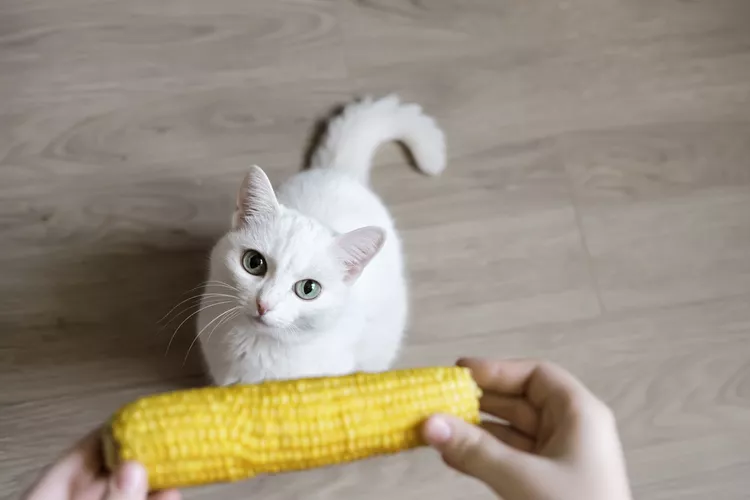
Can Cats Eat Corn? Here's What A Vet Thinks
Corn is a common ingredient in cat food and can be a safe treat for cats when fed in moderation. Find out more about how to safely feed corn to your cat.
10 Obscure, Little-known Canine Facts in Honor of National Dog Day
With National Dog Day upon us, it's time to celebrate everything about our favorite pets—even the weirder stuff. Here are 10 obscure facts about dogs you probably didn't know.
The Different Types of Pet-Friendly Workplaces
Discover the different types of pet-friendly workplaces and the benefits they offer employees. Learn how to create a pet-friendly workplace and the best practices for pet owners.
Exploring the Different Types of Pet-Friendly Beaches
Are you looking for pet-friendly beaches? Learn about the different types of pet-friendly beaches, their locations, and tips for visiting them with your pet.
Why Is My Dog Lethargic?
Lethargy can be a sign that something is wrong with your dog. Find out what may be causing this lack of energy and what you should do about it.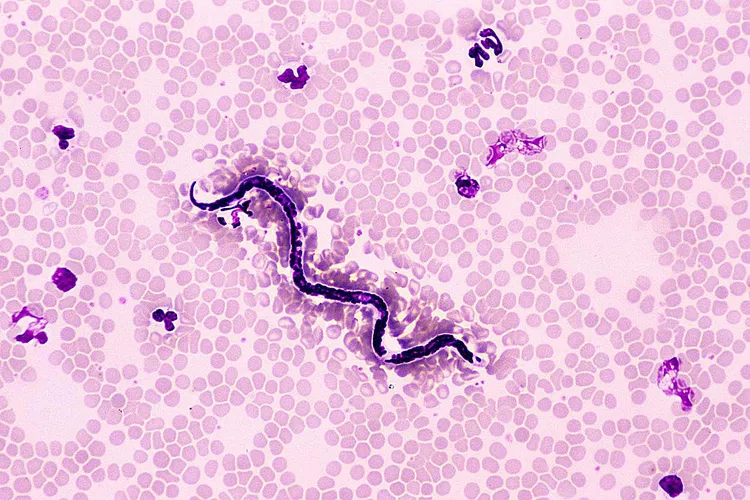
Medications to Prevent Heartworm Disease for Dogs
Heartworm disease is a serious risk for all dogs exposed to mosquitos. Find out about the products used to prevent Heartworm disease in dogs.
Can My Dog Eat Tomatoes?
You'll want to keep Fido out of your garden since the tomato plant is toxic, but you can safely offer him ripe tomatoes as a nutrient-packed treat.
15 Best American Cat Breeds
Several cat breeds, including the American shorthair and Bengal, have their origins in the United States. Learn more about these American cat breeds.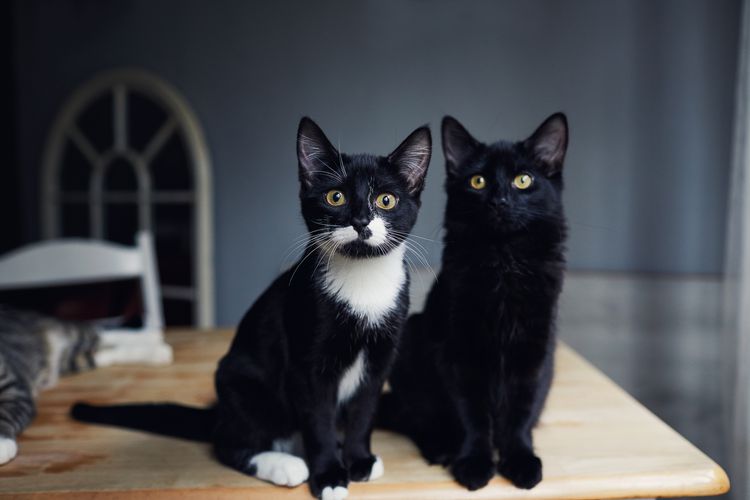
Why Do Cats Slap Each Other?
Cats can have some quirky behaviors—one of them being slapping each other. Why do they do this and what can you do to stop it?
Skye Terrier: Dog Breed Characteristics & Care
Learn all about the Skye Terrier, an elegant breed known for its friendly and even-tempered personality with classic terrier traits.
Sloughi: Dog Breed Characteristics & Care
Learn all about the Sloughi, an ancient dog breed known for its impressive running ability, slim stature, and affection toward its family.
English Setter: Dog Breed Characteristics & Care
Learn about the English setter, an excellent hunting breed for pointing and retrieving game. It's also a popular and affectionate companion dog.
Why Dogs Bury Bones and Other Objects
If you give a dog a bone, he might bury it. Why is that? Learn about this burying behavior in dogs and what it means for your pet.
Reasons Why Dogs Run Away and How to Stop It
Dogs can escape, especially if they’re bored and not properly contained. Here are some techniques for stopping your dog from running away.